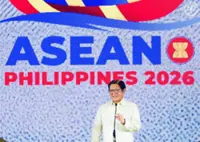KUALA LUMPUR: With Malaysia chairing Asean this year, the regional bloc is set to intensify efforts to bridge boundaries and accelerate coordinated energy initiatives, says Datuk Seri Fadillah Yusof.
Outlining Malaysia’s vision for Asean’s energy future, the Deputy Prime Minister stated that the country will leverage collective strengths to build a resilient and interconnected energy ecosystem supporting both economic growth and environmental sustainability.





